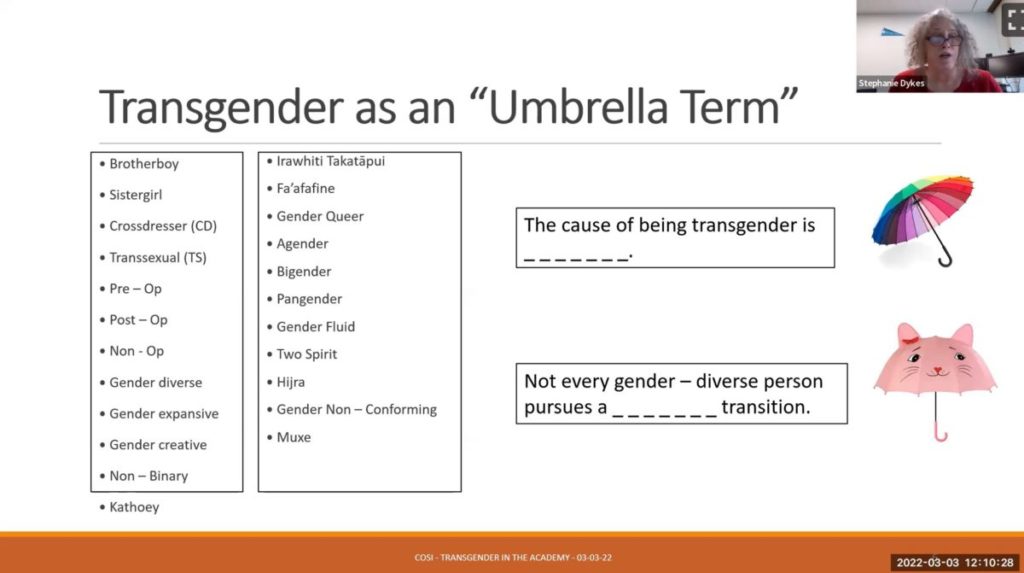“It’s not just transgender people who have a gender identity, everyone has a gender identity.”
—Stephanie Dykes
On Thursday, March 3 via Zoom, Seattle Central College’s library hosted the Winter quarter’s final session of Conversations on Social Issues (COSI) featuring Stephanie Dykes, Ph.D., Executive Director of Institutional Effectiveness at North Seattle College.
Titled “Transgender in Academy: Challenges and Opportunities,” Dykes’ presentation aimed to highlight the experiences of transgender and gender diverse individuals, placing an emphasis on the professional and academic worlds, saying, “I hope what you get out of this presentation is a sense of … the stress that transgender people bring with themselves in their daily lives.”
Dykes began by defining relevant vocabulary such as transgender and gender diverse which she describes as an “umbrella term” for the many gender identities of people who do not identify with their sex assigned at birth. She mentioned similar terms for transgender used across the world from various languages and cultures. Along with this, she included definitions of gender, cisgender, sex, intersex, and sexual orientation.

Touching on the importance of vocabulary, she said, “I am personally glad the word cisgender was invented. … Until I heard that word, I thought of them as ‘real women’ and then ‘women like me’ — as if I was not like a real person.”
With this, Dykes discussed recent anti-trans legislation along with the legal status of transgender people around the world. This included enumeration, exclusionary bathroom policies, the rights of transgender athletes, access to affirming healthcare, and the impacts of these policies on trans individuals.
Dykes would emphasize the differences between the reasoning behind anti-trans policies and the scientific findings of professional medical organizations.
“It seems to be the case that in a lot of states that are putting forward this kind of legislation, they use emotionally charged words,” she said. “So [for example], the Texas governor and attorney general refer to giving health care to trans kids as ‘child abuse.’” Dykes contrasted this with the recommendations of the American Medical Association which states that “Denying transgender students this access endangers their health, safety and well-being, leads to negative health outcomes, and heightens stigma and discrimination.”
Throughout the discussion, Dykes also spoke from her personal experiences as a transgender woman. “[These anti-trans bills have] caused lots of worry among the transgender population,” she said. “And even though I don’t live in Arkansas, … this has an effect on me and other transgender Washingtonians in that it’s like … basically criminalizing your existence.”
Dykes also made a point to acknowledge the intersectionalities of various identities in the trans community and specifically her own privileges as a white transgender woman. She noted that her “life trajectory would be a lot different if I had been born a person of color,” along with the additional challenges “if you are from a low socioeconomic area.”
Dykes would tie these ideas and national trends back to Seattle Colleges, where she is also a member of the Sexual Orientation and Gender Identity (SOGI) team and Demographics Committee. She says SOGI has been “working to update how we ask students about their sexual orientation and gender identity, … [where] within our system, students may choose to indicate their sexual orientation or gender identity through student self-service.”
Additionally, she mentioned Seattle Colleges has classified this as “Category 4 data,” which means “confidential information requiring special handling … up there with social security … and bank account numbers.”
From there, Dykes shared guidelines from the American Association of Collegiate Registrars and Admissions Officers (AACRAO) which incorporates recommendations for academia that prioritize the inclusion and support of transgender individuals — classification of names, pronouns, sex and gender, financial aid and scholarships, admissions, data and reporting, advocacy opportunities, and inclusive staff and faculty practices.
Dykes concluded the presentation by discussing ways to be a trans ally along with including resources for transgender folks and allies such as lifelines, ctcLink guides, recommended books, and LGBTQ support groups and organizations. For more information, a recording of this presentation is available here.
For updates on future COSI’s, visit the Seattle Central College Library website. Sessions are held most Thursdays via Zoom for free, with recordings and presenter slides available within a few days of each live event.
Resources shared for transgender and gender diverse people in crisis:
- The Trevor Project‘s 24/7/365 Lifeline at 866-4-U-TREVOR (866-488-7386) or TrevorChat, their online instant messaging option, or TrevorText, a text-based support option. If you are looking for peer support, you can visit TrevorSpace from anywhere in the world.
- The National Suicide Prevention Lifeline at 800-273-TALK (8255)
- Trans Lifeline at 877-565-886
- Do you live outside the United States? If so, check out The Trevor Project’s list of international resources here.











“Cis” is a way of marginalizing a normal person.